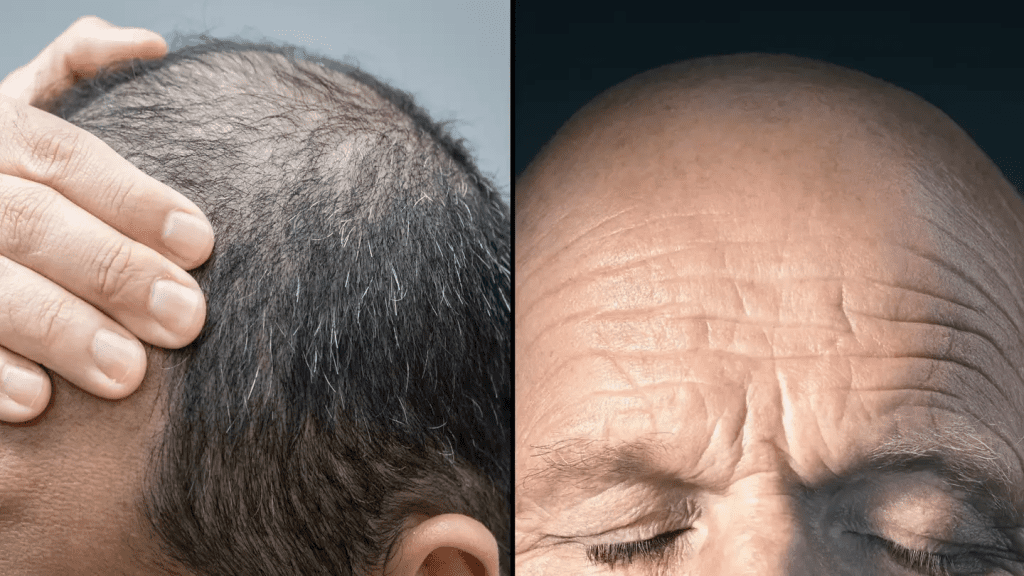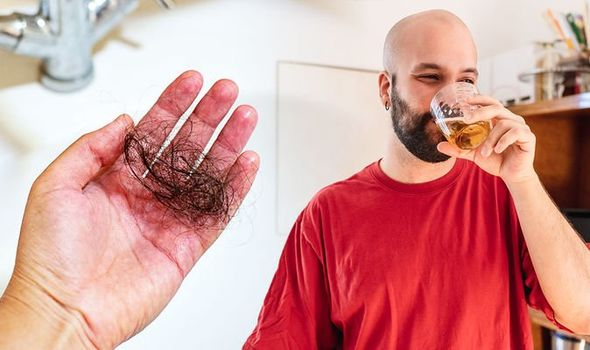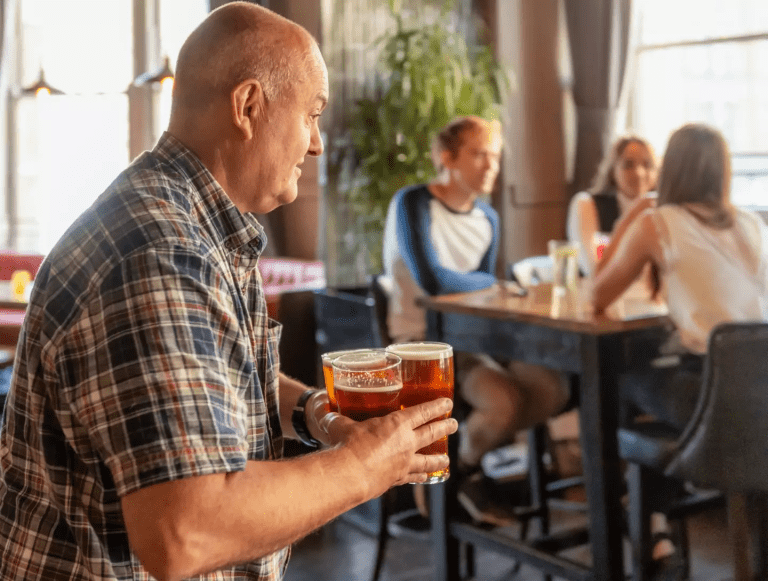Luscious, thick hair is often associated with youth and vitality. But what happens when the hair that once framed your face begins to thin or recede? You’re not alone. Many people experience this, and while some may embrace the change or opt for a bald look, others may struggle with the emotional impact of their hairline disappearing.
But what if the cause of your hair thinning isn’t just age, stress, or genetics? Could alcohol consumption actually play a role? Let’s take a deep dive into the surprising connection between drinking alcohol and hair loss.
Could Drinking Alcohol Be Linked to Hair Loss?

You’ve probably heard that alcohol can have a number of effects on your health. But did you know it could also affect your hair? Research conducted by experts at Pusan National University has unveiled a potential link between alcohol consumption and androgenetic alopecia (AGA), the most common type of hair loss.
While many factors contribute to hair thinning, the idea that alcohol might be one of them is something worth considering. If you’re a social drinker, particularly with the holiday season approaching, understanding how alcohol affects your hair health might be more important than you think.
The Research Behind Alcohol and Hair Loss
Recent studies have revealed an interesting connection between regular alcohol consumption and a higher likelihood of developing androgenetic alopecia. According to research, people who regularly drink alcohol are 1.4 times more likely to experience AGA compared to non-drinkers.
Androgenetic alopecia, commonly referred to as male or female pattern baldness, typically leads to gradual hair thinning, often starting at the temples or crown. While AGA is primarily influenced by genetics and hormones, this study suggests that alcohol might contribute to the development of this condition.
Professor Yun Hak Kim, who led the study, noted that alcohol consumption could slightly increase the risk of experiencing AGA. This finding is significant as it highlights a potential, yet often overlooked, factor in hair loss.
What is Androgenetic Alopecia (AGA)?
Before diving deeper into the alcohol connection, it’s important to understand what androgenetic alopecia (AGA) is. AGA is the most common form of hair loss, affecting both men and women. In men, AGA often leads to a receding hairline and baldness on the crown, while women typically experience more diffuse thinning across the scalp.
The primary drivers of AGA are genetics and hormones, particularly a hormone called dihydrotestosterone (DHT). DHT shrinks hair follicles, leading to thinner and weaker hair. While AGA is a hereditary condition, lifestyle factors such as diet, stress, and alcohol could potentially influence its onset or progression.
The Role of Alcohol in Hair Loss: What’s the Connection?
So how exactly does alcohol affect hair health? While the precise mechanism remains unclear, one hypothesis is that alcohol’s byproduct, acetaldehyde, could be contributing to hair loss. Acetaldehyde interferes with various biological processes, including disrupting the immune system, which might affect hair follicles.
Some researchers believe that alcohol could also alter hormone levels, potentially increasing the levels of DHT or causing imbalances that affect hair growth. However, it’s important to note that while alcohol may contribute to hair loss, it’s likely only one of many factors. More research is needed to establish a definitive link between alcohol consumption and AGA.
Can Alcohol Really Lead to Hair Loss?

If you’ve noticed thinning hair and you drink alcohol regularly, you might be wondering if your alcohol intake is to blame. While alcohol may not be the sole cause of your hair loss, it could be a contributing factor. Genetics, hormonal changes, diet, and other lifestyle choices all play a role in hair thinning.
Limiting alcohol consumption could be a simple yet effective step in supporting your overall health—and potentially improving the health of your hair. If you’re experiencing thinning hair, it’s worth considering how your lifestyle habits, including alcohol intake, might be impacting your hair’s vitality.
What Can You Do to Protect Your Hair?
If you’re concerned about your thinning hair, there are several steps you can take to promote healthier hair growth, even if you enjoy a drink now and then. Here are some tips to help protect your hair:
- Monitor Your Alcohol Consumption: If you drink regularly, it might be helpful to cut back. Reducing alcohol intake can improve your overall health and may have a positive effect on your hair.
- Maintain a Balanced Diet: A diet rich in vitamins and minerals like biotin, zinc, and iron can nourish your hair follicles, promoting growth and strength. Nutritional deficiencies can contribute to hair thinning, so focus on eating a well-rounded diet.
- Practice Stress Management: Chronic stress is another common cause of hair loss. Techniques like meditation, yoga, or exercise can help reduce stress levels, supporting overall hair health.
- Consult a Dermatologist: If your hair thinning is significant, it’s a good idea to consult a dermatologist. They can help identify potential causes of hair loss and offer treatment options that are right for you.
What Does This Mean for Your Lifestyle Choices?

The discovery of a possible link between alcohol consumption and androgenetic alopecia encourages us to reassess our lifestyle choices. While the research is still in its early stages, it presents an opportunity for people to be more mindful about how their habits may affect their health—especially when it comes to hair.
Professor Kim and his team hope that further research will help inform public health guidelines and improve treatment strategies for hair loss in the future. This could lead to better awareness campaigns and more personalized solutions for people struggling with hair thinning.
Conclusion: A Holistic Approach to Hair Health
The connection between alcohol consumption and hair loss is an emerging area of research, and while it’s too early to draw concrete conclusions, the possibility of alcohol contributing to hair thinning should not be ignored. A holistic approach to hair health includes not just managing alcohol intake but also maintaining a balanced diet, managing stress, and prioritizing overall health.
By making informed decisions about your lifestyle and health, you can take proactive steps toward maintaining your hair’s health. With further research on alcohol’s role in androgenetic alopecia, we may soon have a clearer understanding of how lifestyle factors influence hair loss—and how to combat it more effectively. For now, staying informed and mindful of your habits remains the best approach to preserving your hair.


